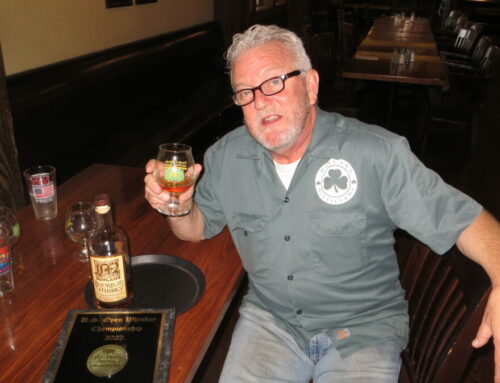I NOTICED the couple immediately, but it wasn’t because of her chestnut eyes or his stylish suit. It was because both of them appeared to be in their early 20s. How early remained to be seen.
In a busy bar, things don’t always break down to first come, first served.
“Be like water,” Bruce Lee once said. And in the fluidic environs of a bar, truer words have never been spoken. Water follows the path of least resistance, and so, too, do bartenders. It has been said that we swap youth for wisdom, and in that moment I did exactly that. Meaning that even though that young couple was most certainly next, I skipped over them to the next couple, both obviously well past 21.
Why? Because I was going to have to check the younger couple’s IDs, which they did not have out (and might not even have). That meant I was going to have to stop everything else I was doing and concentrate on that. Of all the tasks presented to a bartender — making drinks, serving food, washing glasses, etc. — checking IDs is the only one that, if you make one mistake, you can lose your job. Immediately. All that checking was going to take time. And it was my time, and my money.
“Best prepared” probably results in “best served,” especially when it’s busy. Perhaps that is why bars have that unusual social spotlight effect that seems so lacking in coffeehouses and deli counters. In a busy bar, it is the bartender who decides who is next. No amount of complaining to the manager or whining on Yelp is going to change that. Perhaps that is also why the No. 1 question people ask me is, “How do I get a bartender’s attention?”
Bartenders are pretty aware, at least the good ones are. Serving customers directly translates into money for the bartender; it is a commission-based business after all. More customers equals more money — it ain’t rocket science. So taking that into consideration, the question is not how to get a bartender’s attention, but how not to lose it.
Here are some things that cause people to get skipped over in busy bars:
•
Rudeness: If you could choose between dealing with someone rude and someone polite, whom would you pick?
•
Cheapness: Bartenders have long memories and in a commission-based industry you quickly learn to put your energy where it’s going to be the most productive. Don’t believe in tipping more than 10 percent? I bet your second order in that bar takes just that much longer. Call it a hunch.
•
Not being prepared: In the bar business, the axiom is, “The more insistent a person is on immediate service, the less likely he is prepared for that service once it gets there.” Or, as I like to say, “I don’t know what I want, but I know that I want it right now!” Wasting a bartender’s time is really wasting everyone’s time.
•
Level of difficulty: If a bartender knows that you are going to ask for five tastes of wine or for three pisco sours, two mojitos and a muddled old fashioned, or for a compare/contrast of every single beer on draft, he is probably going to first look around for the woman whose last order was four gin and tonics.
•
Level of intoxication: Recently a woman I had not yet waited on asked me, “Are we cut off?” to which, after a second, I answered “Yes, you are.” Even asking such a question leads automatically to a “yes.” Another question of this sort is: “Do you think I can drive?” which, of course results in an automatic “no.” Serving someone visibly intoxicated is against the law. So I ask you to ask yourself: Is the bartender inattentive? Or have you recently spilled a glass of wine? Been asked to keep the noise down? Or fallen down? Has anyone in your party? If so I think you have your answer.
So again, what would cause you to pass someone over in the interest of time? Because whatever that is, the person behind the bar is no different.
Jeff Burkhart is the author of “Twenty Years Behind Bars: The Spirited Adventures of a Real Bartender” as well as an award-winning bartender at a local restaurant. Follow him at www.jeffburkhart.net and contact him at jeffb@thebarflyonline.com


